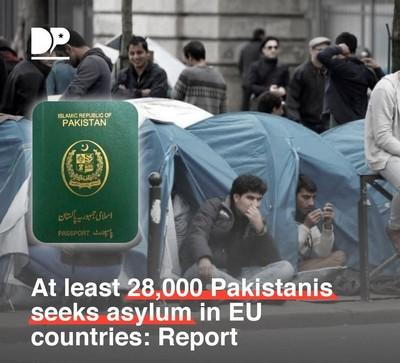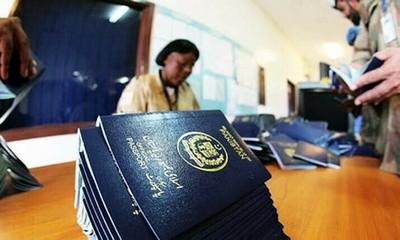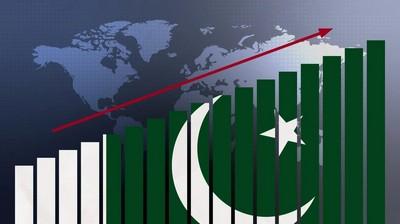
28,000 Pakistanis applied for ‘protection’ in EU in a year: report
Celina Ali
Islamabad: Pakistanis lodged 28,000 applications for international protection in the European Union Plus countries between October 2023 and October this year, the EU’s Agency for Asylum (EUAA) said in a Pakistan-specific report.
The monthly figures have followed a downward trend since reaching a peak in October last year, when Pakistanis lodged around 3,400 applications. The number for October this year stands at 1,900.
Italy was the main receiving country for asylum applications by Pakistanis, followed at a distance by France, Greece and Germany.

According to the “Country Focus on Pakistan Report”, EU Plus countries issued around 20,000 decisions at first instance on Pakistani applications, with just 12 per cent of the applicants being granted refugee status or subsidiary protection.
At the end of October this year, there were nearly 34,000 decisions pending at first instance, according to the report.
The report outlines the political and security context in Pakistan, the main actors involved in shaping it, the role of the judiciary, as well as the treatment of certain groups of the country’s population.
It provides an overview of the political and security context of the country, the treatment of certain profiles and groups of the country’s population and the situation of Afghan refugees.

With an estimated 2.4 million people experiencing forced labour or forced marriage, Pakistan is rated as one of the countries with the highest vulnerability to modern slavery in the region.
The country is located on a major trafficking route, including trade in human organs.
Despite having laws in place to combat trafficking in human beings, the country’s fragile democracy and poor state of accountability were said to have hindered an effective enforcement of those laws.
As of 2023, Pakistan did not fully meet the minimum standards for the elimination of trafficking, although the government has made significant efforts to this end.
However, corruption and complicity of state officials in trafficking crimes have hampered law enforcement action and created a culture of impunity.
The main human trafficking issue in Pakistan is bonded labour (or debt-bondage). Estimates of people affected by this evil range between three million and 4.5m.
The system of debt-bondage is based on a traditional practice of giving `Peshgi’, or Begar, a loan given to a labourer.
Repayment of such loans is said to be virtually impossible due to high interest rates and exploitative practices of creditor-employers.
Due to weak implementation of the law, authorities have failed to protect individual victims of bonded labour.
The report says that violence in Pakistan has escalated since October last year, particularly in Khyber-Pakhtunkhwa and Balochistan. Groups such as the Tehrik-i-Taliban Pakistan (TTP) and the Baloch Liberation Army (BLA) have intensified their “insurgent activities”.
The Islamic State in Khorasan Province (ISKP), an offshoot of the militant Islamic State (IS) group, has also intensified its activities and dissemination of propaganda. It even makes use of artificial intelligence (AI) to spread its narrative.
By September this year, there were over three million Afghans residing in Pakistan. The government’s Illegal Foreigners Repatriation Plan (IFRP) has led to the return of 738, 583 Afghans and resulted in arrest, harassment, and an increasingly hostile environment for Afghans.
